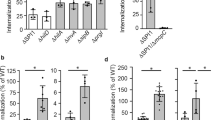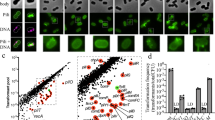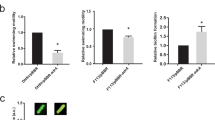Abstract
KORT et al.1 have described the methylation of a membrane protein which seems to be involved in bacterial chemotaxis: they show that addition of attractants affects the methylation, that the source of the methyl group is methionine, a compound required for chemotaxis, and that certain non-chemotactic mutants fail to carry out the methylation reaction. There is no relationship, however, between the amount of methylation and the tumble frequency, and the exact role of this methylation, therefore, remains mysterious. Control of the tumbling process is essential for chemotaxis; peritrichous bacteria swim in short straight-line runs that are separated by abrupt changes of direction (tumbles). In the presence of attractants, however, the tumbling frequency either decreases or increases as the bacterium swims up or down the concentration gradient, respectively2. Runs are due to counterclockwise rotation of the flagella, whereas clockwise rotation causes tumbling3. Aswad and Koshland4 have proposed the existence of a “tumble-regulating substance” that would control the direction of the rotation: clockwise rotation of the flagella (and therefore tumbling of the bacteria) occurring when the concentration of this regulating substance falls below a certain threshold. The same authors have suggested that S-adenosyl-methionine, the product of the reaction of one molecule of methionine with one molecule of ATP5, might be necessary for the degradation of the tumble regulator. I propose that the methylated protein described by Kort et al.1 may be the inactivated tumble regulator.
This is a preview of subscription content, access via your institution
Access options
Subscribe to this journal
Receive 51 print issues and online access
$199.00 per year
only $3.90 per issue
Buy this article
- Purchase on Springer Link
- Instant access to full article PDF
Prices may be subject to local taxes which are calculated during checkout
Similar content being viewed by others
References
Kort, E. N., Goy, M. F., Larsen, S. H. & Adler, J. Proc. natn. Acad. Sci. U.S.A. 72, 3939–3943 (1975).
Berg, H. C. & Brown, D. A. Nature 239, 500–504 (1972).
Larsen, S. H., Reader, R. W., Kort, E. N., Tso, W. W. & Adler, J. Nature 249, 73–77 (1974).
Aswad, D. & Koshland, D. E., Jr J. molec. Biol. 97, 207–223 (1975).
Cantoni, G. L. Meth. Enzym. 3, 600–603 (1957).
Macnab, R. & Koshland, D. E., Jr Proc. natn. Acad. Sci. U.S.A. 69, 2509–2512 (1972).
Springer, M. S. et al., Proc. natn. Acad. Sci. U.S.A. 72, 4640–4644 (1975).
Aswad, D., Koshland, D. E., Jr J. Bact. 118, 640–645 (1974).
Larsen, S. H., Adler, J., Gargus, J. J. & Hogg, R. W. Proc. natn. Acad. Sci. U.S.A 71 1239–1243 (1974).
Axelrod, J. Science 126, 400–401 (1957).
Axelrod, J. & Tomchick, R. J. biol. Chem. 233, 702–705 (1958).
Author information
Authors and Affiliations
Rights and permissions
About this article
Cite this article
FRÈRE, JM. Bacterial tumble regulator may be inactivated by methylation. Nature 266, 261–262 (1977). https://doi.org/10.1038/266261a0
Received:
Accepted:
Published:
Issue Date:
DOI: https://doi.org/10.1038/266261a0
Comments
By submitting a comment you agree to abide by our Terms and Community Guidelines. If you find something abusive or that does not comply with our terms or guidelines please flag it as inappropriate.



